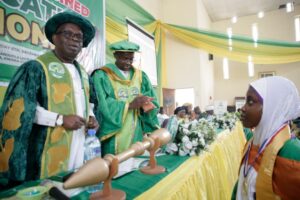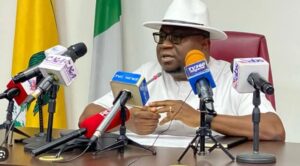
The All Progressives Congress (APC) National Leader, Bola Tinubu, has disclosed that the Nigerian economy would only achieve projected positive rebound through adoption of active fiscal policy that would boost the fragile economy.
He added that since the country’s economy remains weak despite exiting recession, there was need for fiscal wisdom in running the nation’s economy adversely affected by COVID-19 pandemic outbreak.
Tinubu, who is also a former Lagos State governor said that aside from adopting active fiscal policy, it was important for the Federal Government to reduce the unemployment rate across the country and curb rising insecurity.
The APC leader spoke on Saturday while delivering a speech as the chairman of the 2021 Sardauna Memorial Lecture held in honour of the late Sir, Ahmadu Bello. His lecture was on ‘Reduction of the Cost of Governance for Inclusive Growth and Youth Development in Northern Nigeria in a Post-COVID-19 Era’.
Tinubu added that the twin effect of coronavirus pandemic and massive unemployment were responsible for the weak economy despite exiting the recession and deliberate actions must be taken in reversing the trend.
According to him, in the midst of our local challenges came the COVID-19 pandemic, with its debilitating impact on the global and domestic economies. Nigeria, like many other countries, has not been spared the impact of the pandemic.
He added that though policies and incentives were put in place by the President Muhammadu Buhari-led administration following COVID-19 pandemic outbreak, the economy remains weak with too much unemployment and resources left idle.
“Fiscal wisdom but not necessarily austerity is required for an economy like ours in a time like this, to ensure equitable wealth redistribution and meaningful use of resources.
“The years have shown that the private sector is much too weak to spur the growth we need. If the private sector could manage this feat, it would have already done so. Where the private sector is too weak or unable, the government must fill the void.
“This means government must not be afraid to embark on an active fiscal policy to create jobs, build infrastructure and develop our industrial sector as well as continue to improve agriculture. This means government must spend money but spend it on those things that bring the requisite economic returns for the nation,” he said.
Tinubu added that government must implement a national industrial policy to encourage key industries to begin to employ the country’s growing population.
“The development of any populous nation has always been dependent on the ability of government to allocate sufficient funds to projects and programs that create and encourage enduring growth and employment. We must reject that mode of thinking that assumes government expenditure is inherently unproductive as well as harmful to the overall economy.
“It is not the fact that government expenditure is intrinsically wrong any more than one can say all private sector activity is economically positive. Government can be wasteful or it can be the key component to growth just as a private sector business can function profitably or spend itself into bankruptcy.
“The issue is not whether government is spending money or not. The real issue is the economic utility and quality of the expenditure,” he added.












